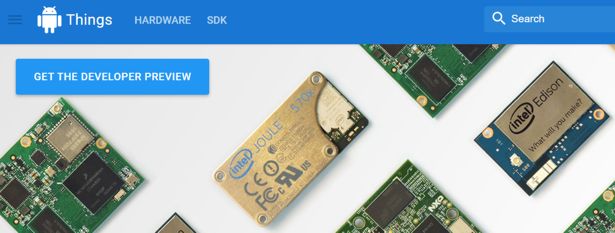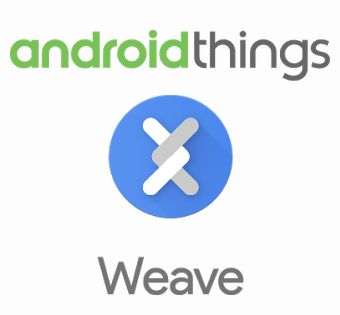| Android Things - Google's IoT |
| Written by Harry Fairhead | |||
| Friday, 16 December 2016 | |||
|
Google has announced a public developer preview of Android Things, a rebranding of Project Brillo, its Android-based operating system for the Internet of Things, which until now has been restricted to invitation-only access. For a closer look at Android Things see: Getting Started With Google's Android Things
Android Things is Google's latest and most comprehensive attempt to become a player in the Internet of Things. It builds on Project Brillo which, together with Google Weave was announced at Google I/O in May 2015 and can be seen as the successor to the earlier home automation operating system Android@Home, which we covered back in 2011. This first version of Android Things includes:
Future iterations are intended to incorporate Google’s Weave platform, Google Cloud Platform, over-the-air updates from Google and the Google IoT Developer Console.
Android Things is currently available for Raspberry Pi 3, NXP Pico and Intel Edison with support for the Intel Joule Computer Module coming soon. Intel has been one of Google's partners in Project Brillo. Sameer Sharma, GM of Intel’s New Market Developments, Internet of Things Group is enthusiastic about the possibilities presented by Android Things, saying: "We are only beginning to see the technological revolution made possible by the Internet of Things. I believe Android Things will be a catalyst in the widespread adoption of IoT in both consumer and enterprise applications. The OS will allow companies to quickly bring new, life-changing products to the market. Android changed the way we use and think about our mobile devices, Android Things has the potential to do the same with the billions of connected IoT devices that will come to market, including products for home, building, and industrial settings.” The Google blog post announcing Android Things also has news of Weave. Wayne Piekarski, Developer Advocate for IoT, writes: We are also updating the Weave platform to make it easier for all types of devices to connect to the cloud and interact with services like the Google Assistant. Device makers like Philips Hue and Samsung SmartThings already use Weave, and several others like Belkin WeMo, LiFX, Honeywell, Wink, TP-Link, and First Alert are implementing it. Weave provides all the cloud infrastructure, so that developers can focus on building their products without investing in cloud services. Weave also includes a Device SDK for supported microcontrollers and a management console. The Weave Device SDK currently supports schemas for light bulbs, smart plugs and switches, and thermostats. In the coming months we will be adding support for additional device types, custom schemas/traits, and a mobile application API for Android and iOS. Finally, we're also working towards merging Weave and Nest Weave to enable all classes of devices to connect with each other in a secure and reliable way. So whether you started with Google Weave or Nest Weave, there is a path forward in the ecosystem.
More InformationRelated ArticlesAndroid@Home - easy home automation? Getting Started With Google's Android Things
To be informed about new articles on I Programmer, sign up for our weekly newsletter, subscribe to the RSS feed and follow us on Twitter, Facebook or Linkedin.
Comments
or email your comment to: comments@i-programmer.info
|
|||
| Last Updated ( Saturday, 16 September 2017 ) |




